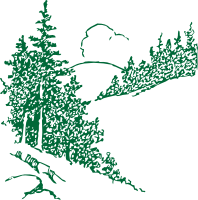Associations to the word «Forest»
Noun
- Shrub
- Climate
- Lawn
- Hickory
- Grazing
- Wildlife
- Bog
- Poplar
- Deer
- Foothill
- Usda
- Shelter
- Fern
- Birch
- Hills
- Seedling
- Acacia
- Alder
- Lumber
- Cm
- Cypress
- Palatine
- Foliage
- Dweller
- Conservation
- Palatinate
- Marsh
- Land
- Parkland
- Elevation
- Boar
- Watershed
- Headwater
- Arboretum
- Regeneration
- Monsoon
- Bough
- Forage
- Chestnut
- Fragmentation
- Slope
- Ravine
- Fauna
- Prairie
- Waterfall
- Tropic
- Catchment
- Expanse
- Gifford
- Maple
- Andes
- Sawmill
- Reserve
- Yellowstone
- Lichen
- Hunting
- Acre
- Conserve
- Savannah
- Planting
- Jungle
Adjective
Pictures for the word «Forest»
Wiktionary
FOREST, noun. A dense collection of trees covering a relatively large area. Larger than woods.
FOREST, noun. Any dense collection or amount.
FOREST, noun. (historical) A defined area of land set aside in England as royal hunting ground or for other privileged use; all such areas.
FOREST, noun. (graph theory) A disjoint union of trees.
FOREST, verb. (transitive) To cover an area with trees.
FOREST FALCON, noun. Any of the small New World falcons of the genus Micrastur.
FOREST FIRE, noun. A fire, often large, that consumes a forest or woodland.
FOREST FIRES, noun. Plural of forest fire
FOREST FLIES, noun. Plural of forest fly
FOREST FLY, noun. Any of numerous species of blood-sucking flies of the family Tabanidae.
FOREST FLY, noun. A fly of the genus Hippobosca, especially Hippobosca equina; a horse tick.
FOREST FRUITS, noun. Edible fruits that typically grow in forests, such as berries.
FOREST GREEN, noun. A dark green colour, like that of a forest when green.
FOREST GREEN, adjective. Of a dark green colour, like that of a forest when green.
FOREST GREEN TREE FROG, noun. A tropical lowland frog (Rhacophorus arboreus) whose habitat range is mostly restricted to Japan's Honshū
FOREST MACHINE, noun. A machine used for logging or various other forestry purposes.
FOREST MAHOGANY, noun. (obsolete) (AU) Red mahogany, Eucalyptus resinifera.
FOREST OF DEAN, proper noun. An area of Gloucestershire, between the rivers Severn and Wye, with a long history of mining.
FOREST PLOT, noun. (statistics) A graphical display used in meta-analysis designed to illustrate the relative strength of treatment effects in multiple quantitative scientific studies addressing the same question.
FOREST PLOTS, noun. Plural of forest plot
Dictionary definition
FOREST, noun. The trees and other plants in a large densely wooded area.
FOREST, noun. Land that is covered with trees and shrubs.
FOREST, verb. Establish a forest on previously unforested land; "afforest the mountains".
Wise words
Speak clearly, if you speak at all; carve every word before
you let it fall.



